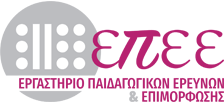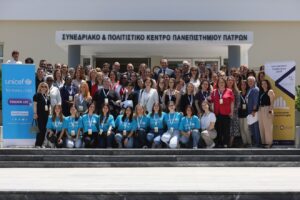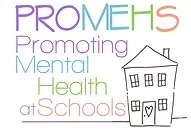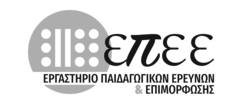





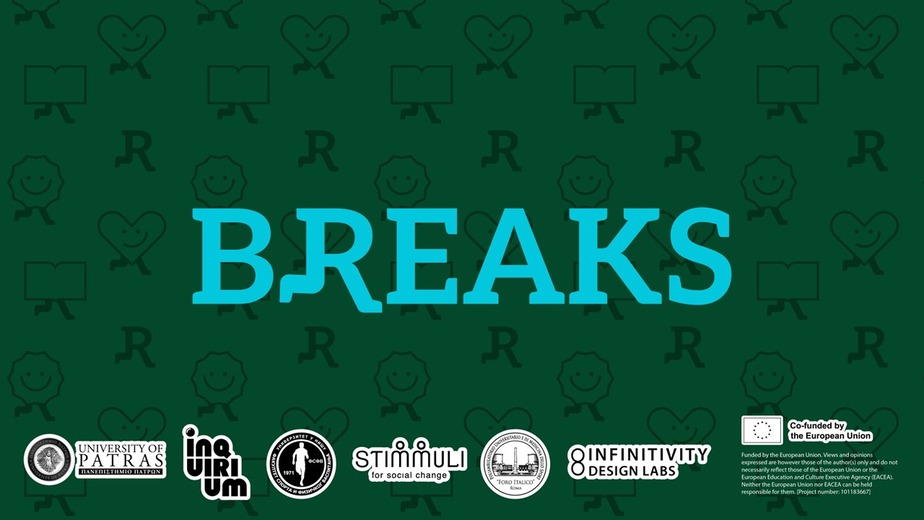

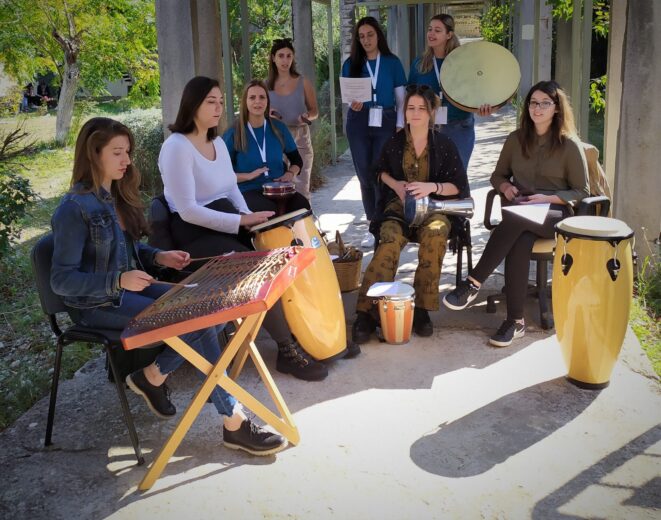
RESEARCH AREAS
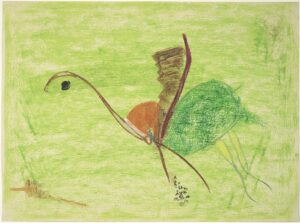
Aesthetic education aims to enhance the learner’s ability to comprehend the meanings of various different modes of expression; that is, to understand and interact with figures full of meaning. Everything in the world has the potential to be viewed as a producer of such meanings, as a figure full of meanings or, put otherwise, as an aesthetical experience. The arts, however, are exactly those forms of intentional acts of figure creation that allow such meanings to emerge. As a result, learning of the arts is aesthetic education’s pathway to knowledge.
Aesthetic education and its goals may best be served by comprehensive arts education programs. Such programs, focusing on the unique character of the arts as meaning-givers, permit the cultivation of students’ ability to develop complete aesthetic responses, while, concurrently, revealing the complex (experiential-emotional and cognitive) nature of aesthetic perception overall.
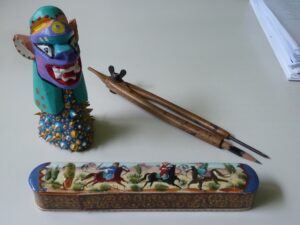 The anthropological approach allows us to study instituted educational acts holistically. In addition, in light of the fact that education takes place within a certain set of cultural trends, customs, lifestyles and worldviews, the anthropological perspective helps us better understand the overarching cultural environment they form.
The anthropological approach allows us to study instituted educational acts holistically. In addition, in light of the fact that education takes place within a certain set of cultural trends, customs, lifestyles and worldviews, the anthropological perspective helps us better understand the overarching cultural environment they form.
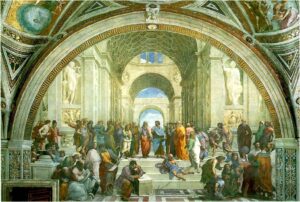 Lifelong Learning refers to a holistic approach to the entirety of educational and learning activities and aims to combine them into a cohesive unit in a space-time continuum. Current research into lifelong learning encompasses issues such as how people shape and reshape themselves through learning and education, the processes through which perception and belief shift, the connections between the various systems of formal, non-formal and informal education, and the conditions for civil participation in educational activities.
Lifelong Learning refers to a holistic approach to the entirety of educational and learning activities and aims to combine them into a cohesive unit in a space-time continuum. Current research into lifelong learning encompasses issues such as how people shape and reshape themselves through learning and education, the processes through which perception and belief shift, the connections between the various systems of formal, non-formal and informal education, and the conditions for civil participation in educational activities.
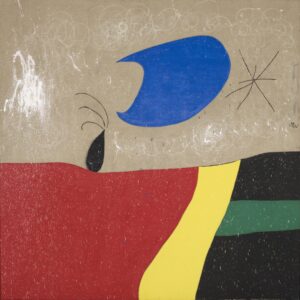 In the field of Early Childhood Education, a variety of approaches are explored, highlighting the multiple factors that influence, facilitate, and enrich the teaching and learning of young children. At the same time, these factors create opportunities for discussion and critical reflection with both future and practising educators working in preschool and early primary education settings. From a research standpoint, Early Childhood Education covers a broad range of concepts and processes, with the aim of empowering and supporting all those involved in education. This includes the development or revision of high-quality curricula, exploring the ideas and perspectives of both children and educators, participatory pedagogical practices in teaching and professional development, action research, play and playful learning, differentiated instruction, authentic assessment, and collaboration among educators, with children, with families, and with other stakeholders. In parallel, the field examines issues related to the training of early childhood educators, with an emphasis on creating imaginative and stimulating learning environments.
In the field of Early Childhood Education, a variety of approaches are explored, highlighting the multiple factors that influence, facilitate, and enrich the teaching and learning of young children. At the same time, these factors create opportunities for discussion and critical reflection with both future and practising educators working in preschool and early primary education settings. From a research standpoint, Early Childhood Education covers a broad range of concepts and processes, with the aim of empowering and supporting all those involved in education. This includes the development or revision of high-quality curricula, exploring the ideas and perspectives of both children and educators, participatory pedagogical practices in teaching and professional development, action research, play and playful learning, differentiated instruction, authentic assessment, and collaboration among educators, with children, with families, and with other stakeholders. In parallel, the field examines issues related to the training of early childhood educators, with an emphasis on creating imaginative and stimulating learning environments.
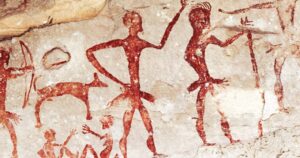 Each culture and society develops its own physical practices which accompany the daily life and rituals of their members, comprise their history, dictate their understanding of the world and of “being” itself, define their identity and actively contribute to their education. Such physical practices may be observed in folk festivals, traditional celebrations and festivals. Other physical practices are dances, events, games, various forms of sports and exercise, body decoration, carnivals, outdoor activities just to name a few.
Each culture and society develops its own physical practices which accompany the daily life and rituals of their members, comprise their history, dictate their understanding of the world and of “being” itself, define their identity and actively contribute to their education. Such physical practices may be observed in folk festivals, traditional celebrations and festivals. Other physical practices are dances, events, games, various forms of sports and exercise, body decoration, carnivals, outdoor activities just to name a few.
 The field of inclusive education is founded on the human right to equal access and participation, aiming to ensure learning and development for all individuals without discrimination, particularly without discrimination on the basis of disability. From this perspective, research investigates the processes taking place at both policy and practice levels, focusing on the extent to which they point toward systemic changes that foster more inclusive care and education centres, school settings, and frameworks related to adult life, including the transitions between them. The research also focuses on themes such as: peer collaboration between individuals with and without disabilities; the connection between families and learning environments; and the initial training and professional development of professionals in inclusive education and related fields, such as early childhood intervention, parental empowerment, and vertical transitions. While some of these themes have been studied within the broader domain of special education, both nationally and internationally, inclusive education should not be equated with special education. The research field of inclusive education follows a distinct path that does not align with that of special education, which is based on a categorical approach to disability and promotes practices and interventions aimed at ‘correcting’ the individual characteristics of persons with disabilities in accordance with a normative model, often leading to their segregation or assimilation into static learning and other environments.
The field of inclusive education is founded on the human right to equal access and participation, aiming to ensure learning and development for all individuals without discrimination, particularly without discrimination on the basis of disability. From this perspective, research investigates the processes taking place at both policy and practice levels, focusing on the extent to which they point toward systemic changes that foster more inclusive care and education centres, school settings, and frameworks related to adult life, including the transitions between them. The research also focuses on themes such as: peer collaboration between individuals with and without disabilities; the connection between families and learning environments; and the initial training and professional development of professionals in inclusive education and related fields, such as early childhood intervention, parental empowerment, and vertical transitions. While some of these themes have been studied within the broader domain of special education, both nationally and internationally, inclusive education should not be equated with special education. The research field of inclusive education follows a distinct path that does not align with that of special education, which is based on a categorical approach to disability and promotes practices and interventions aimed at ‘correcting’ the individual characteristics of persons with disabilities in accordance with a normative model, often leading to their segregation or assimilation into static learning and other environments.
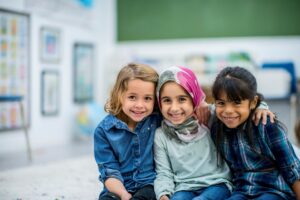 Educational Psychology is the scientific field that bridges two domains - education and psychology - focusing primarily on the application of psychological methods to the study and practice of teaching and learning. It addresses a wide range of issues related to student development (cognitive, linguistic, psychosocial, and moral), individual differences, assessment, learning processes, motivation for achievement, classroom management, and the professional development of teachers. More specifically, Educational Psychology places particular emphasis on cultivating social and emotional skills in both students and educators; effectively addressing students’ emotional and behavioural difficulties; examining the interplay between teachers’ emotions and their pedagogical practices; and supporting positive interpersonal relationships within the school environment. As such, it is a vital discipline that contributes significantly to the training of both students and teachers, and to the ongoing professional development of educators across all levels of education.
Educational Psychology is the scientific field that bridges two domains - education and psychology - focusing primarily on the application of psychological methods to the study and practice of teaching and learning. It addresses a wide range of issues related to student development (cognitive, linguistic, psychosocial, and moral), individual differences, assessment, learning processes, motivation for achievement, classroom management, and the professional development of teachers. More specifically, Educational Psychology places particular emphasis on cultivating social and emotional skills in both students and educators; effectively addressing students’ emotional and behavioural difficulties; examining the interplay between teachers’ emotions and their pedagogical practices; and supporting positive interpersonal relationships within the school environment. As such, it is a vital discipline that contributes significantly to the training of both students and teachers, and to the ongoing professional development of educators across all levels of education.
